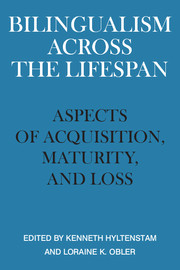Book contents
- Frontmatter
- Contents
- List of contributors
- Preface
- 1 Bilingualism across the lifespan: an introduction
- 2 Early differentiation of languages in bilingual children
- 3 Variation in children's ability to learn second languages
- 4 Idiomaticity as an indicator of second language proficiency
- 5 Prefabs, patterns and rules in interaction? Formulaic speech in adult learners' L2 Swedish
- 6 The imperfect conditional
- 7 Spanish, Japanese and Chinese speakers' acquisition of English relative clauses: new evidence for the headdirection parameter
- 8 Distinguishing language contact phenomena: evidence from Finnish–English bilingualism
- 9 The boustrophedal brain: laterality and dyslexia in bi-directional readers
- 10 Deterioration and creativity in childhood bilingualism
- 11 Crosslinguistic influence in language loss
- 12 Bilingualism in Alzheimer's dementia: two case studies
- 13 Language processing in the bilingual: evidence from language mixing
- Index
7 - Spanish, Japanese and Chinese speakers' acquisition of English relative clauses: new evidence for the headdirection parameter
Published online by Cambridge University Press: 05 June 2012
- Frontmatter
- Contents
- List of contributors
- Preface
- 1 Bilingualism across the lifespan: an introduction
- 2 Early differentiation of languages in bilingual children
- 3 Variation in children's ability to learn second languages
- 4 Idiomaticity as an indicator of second language proficiency
- 5 Prefabs, patterns and rules in interaction? Formulaic speech in adult learners' L2 Swedish
- 6 The imperfect conditional
- 7 Spanish, Japanese and Chinese speakers' acquisition of English relative clauses: new evidence for the headdirection parameter
- 8 Distinguishing language contact phenomena: evidence from Finnish–English bilingualism
- 9 The boustrophedal brain: laterality and dyslexia in bi-directional readers
- 10 Deterioration and creativity in childhood bilingualism
- 11 Crosslinguistic influence in language loss
- 12 Bilingualism in Alzheimer's dementia: two case studies
- 13 Language processing in the bilingual: evidence from language mixing
- Index
Summary
Consistent with the general theme of this book, my purpose in this paper is to discuss system interaction in bilingualism. While many of the chapters focus on the normal and abnormal interaction of different aspects of language in speakers who have learned two or more languages simultaneously, I focus on the adult learner's acquisition of a second language, or sequential bilingualism in traditional terms. Within this context, I consider the relative contributions of past first language (L1) experience and processes independent of this in second language (L2) learning. I argue that the parameter-setting model of Universal Grammar (UG) hypothesized for L1 acquisition provides an explanatory framework within which to integrate these two components. In addition, I argue that this work can clarify our understanding of questions and issues related to normal and abnormal bilingual processing in much the same manner that investigations of this sort inform theories of L1 acquisition. In adult L2 learning we are dealing with sophisticated learners whose pragmatic and general cognitive abilities are for the most part fully developed. In both child L1 acquisition and in the simultaneous acquisition of two languages, we are often working with individuals who are at immature stages both in terms of their language abilities and in terms of their general pragmatic and cognitive development.
- Type
- Chapter
- Information
- Bilingualism across the LifespanAspects of Acquisition, Maturity and Loss, pp. 116 - 131Publisher: Cambridge University PressPrint publication year: 1989
- 12
- Cited by



